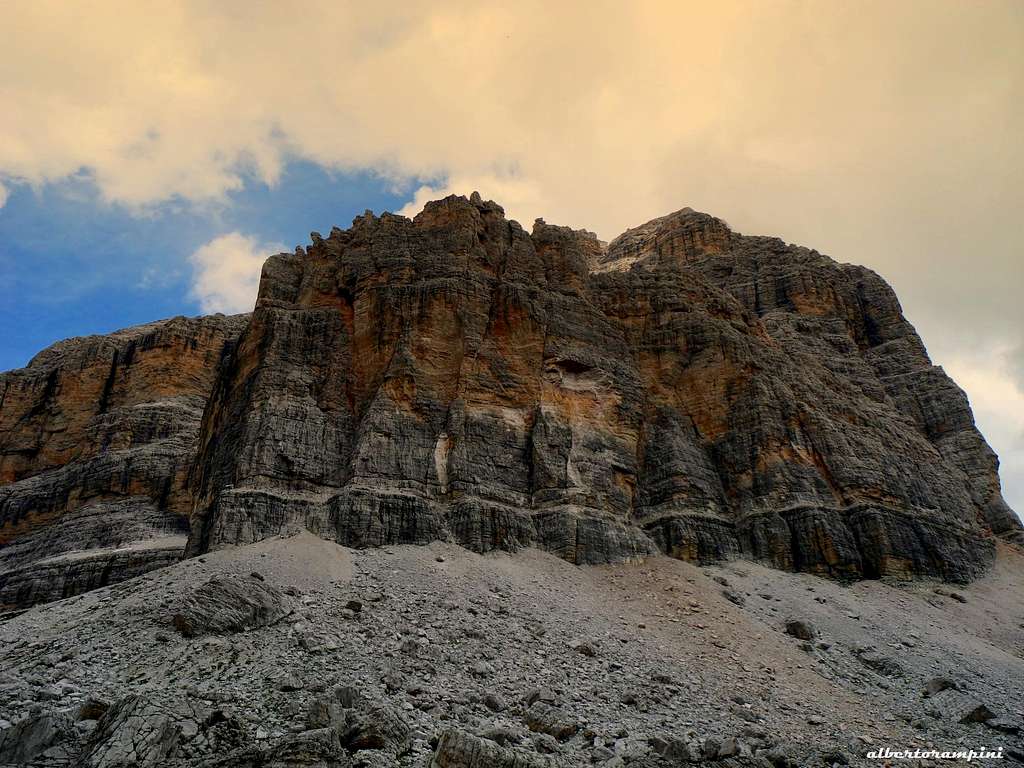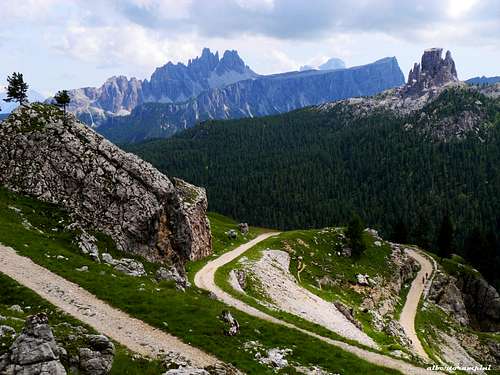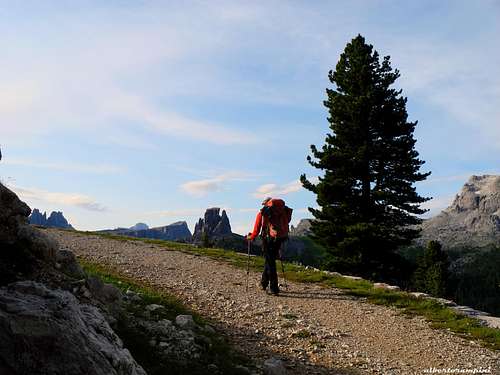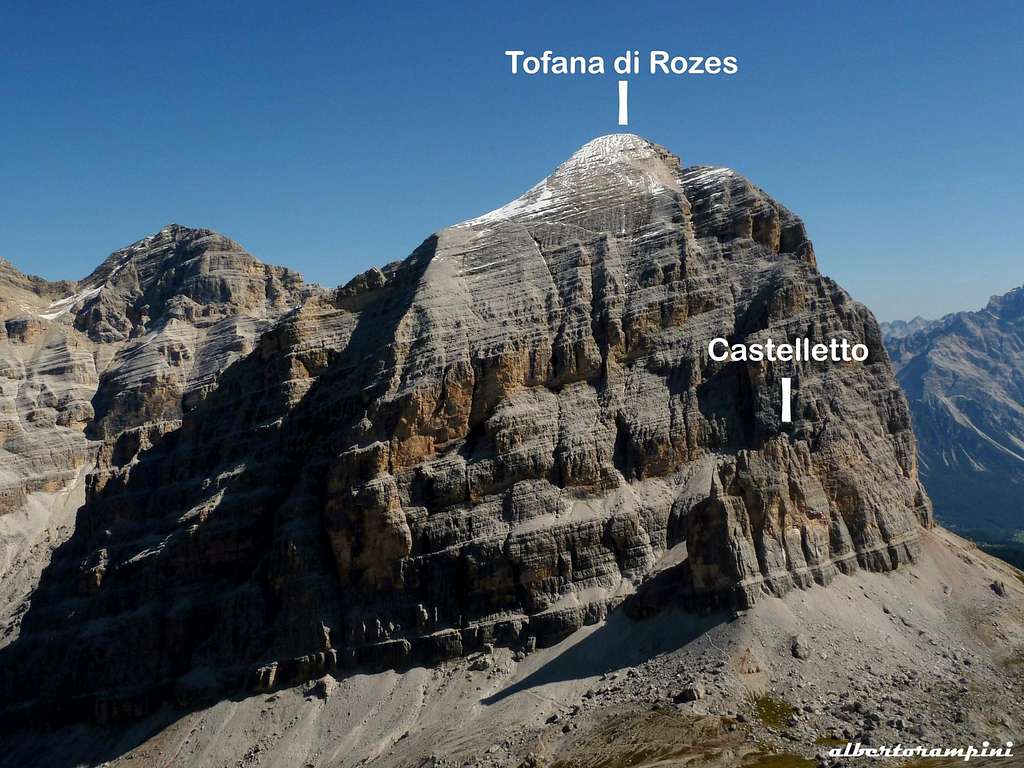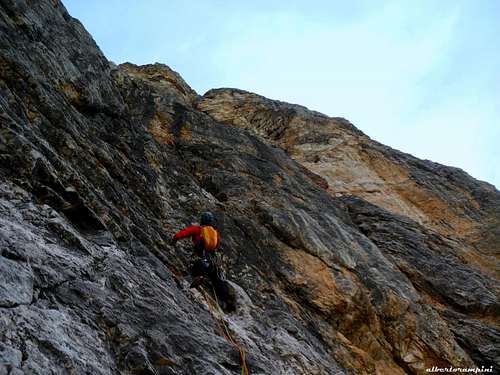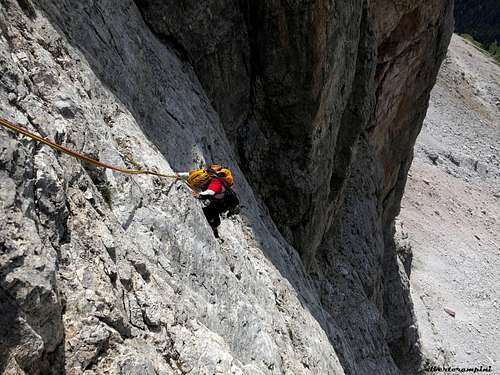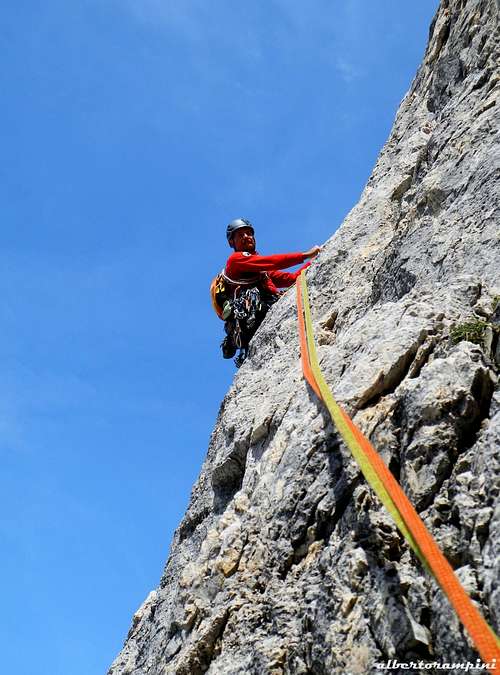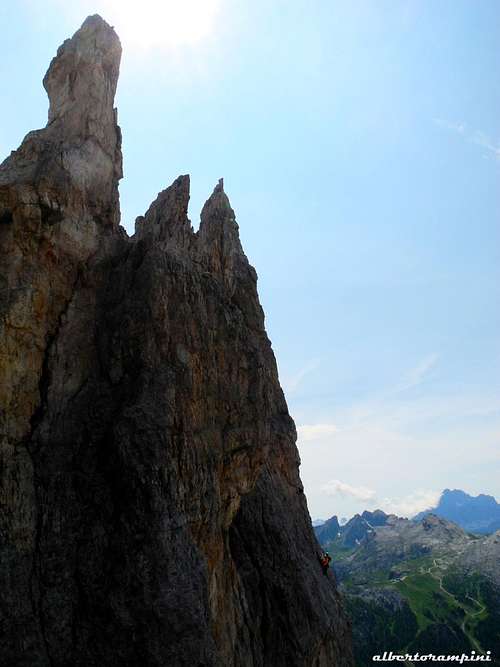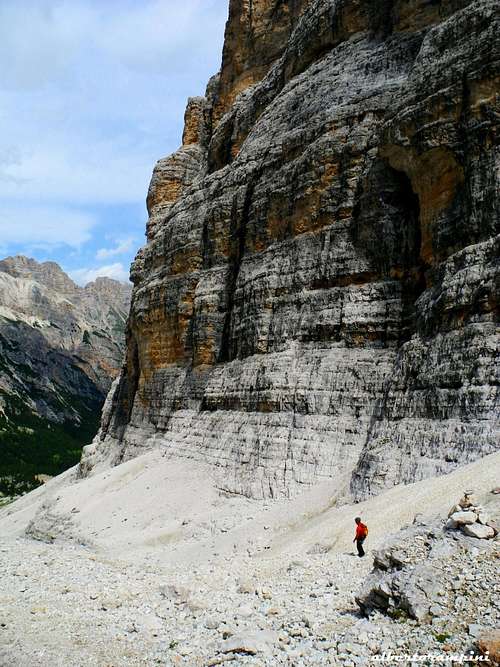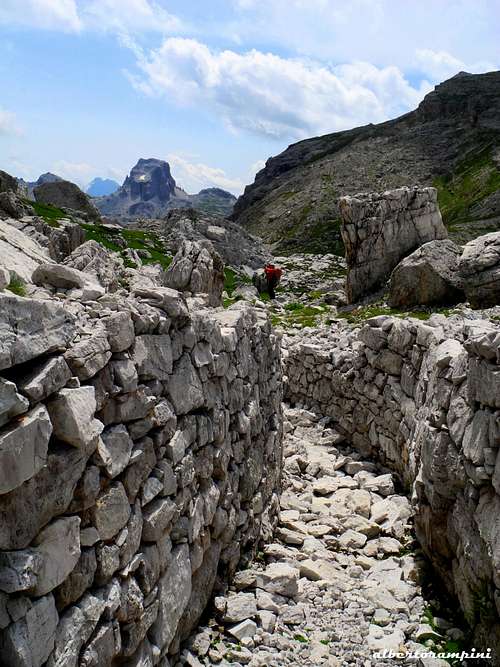-
 9499 Hits
9499 Hits
-
 89.77% Score
89.77% Score
-
 30 Votes
30 Votes
|
|
Mountain/Rock |
|---|---|
|
|
46.53385°N / 12.04232°E |
|
|
Veneto |
|
|
Hiking, Trad Climbing, Sport Climbing, Scrambling |
|
|
Summer |
|
|
8714 ft / 2656 m |
|
|
Overview
Il Castelletto 2656 m
Il Castelletto 2656 m A fine and interesting rocky tower showing a high quality dolomia lies in the neighbourhood of the gigantic Tofana di Rozes. It's Castelletto. This peak belongs to the Tofane group, a famous massif consisting of three main peaks beyond 3200 meters of altitude and some smaller satellites, as Castelletto to the West and Torrioni di Pomedes and Ra Valles to the East, and overlooking the beautiful valley of Cortina d’Ampezzo. Il Castelletto is located between Val Costeana and Val Travenanzes and looks really tiny if compared to the huge amount of nearby Tofane; however, its attractive West wall is beyond 200 meters high and has some fantastic climbing routes of first class “dolomia”. In the past this peak became infamous for being the scene of heavy fighting between the Italian and the Austro-Hungarian army during the First World War; luckily Castelletto is now the theatre of beautiful and challenging free climbing in a superb landscape.
Getting There
Road access
- Road approach from Belluno: follow the road SS 51 towards North, getting Longarone and Pieve di Cadore; from Pieve the SS51 turns to left, reaching San Vito di Cadore and Cortina d’Ampezzo. Once you get to Cortina d'Ampezzo take the road SS48 to Passo Falzarego and follow it to the roadhouse Ra Nona,located on the right about 1,5 kilometer before the pass.
- Road approach from Verona, Trento, Bolzano and Brennero: take the Brennero Motorway, exit Ponte Gardena and then follow the Val Gardena road to Selva di Val Gardena and Passo Gardena, reaching Corvara and La Villa. Turn to right towards PassoFalzarego, get the pass and here descent towards left along the road SS48 towards Cortina d’Ampezzo as far as the roadhouse Ra Nona, located on the left about 1,5 kilometer after Passo Falzarego.
Walking access to Nort-West and South-West faces routes From the road-house Ra Nona, located about 1.5 km before the Falzarego Pass coming from Cortina, take the path n. 412 that enters the wood and then crosses the gravel road towards Forcella Col dei Bos. Follow the dirt track to the right until it ends, then continue along the easy path n. 402 to the saddle of Col dei Bos m. 2331. Here turn right on very rough ground and rise in the direction of the well visible South West wall of Castelletto, walking amongst the remains of the military stations of the Great War and heading to a large squared boulder clearly visible from below (1,15 hour from the parking).
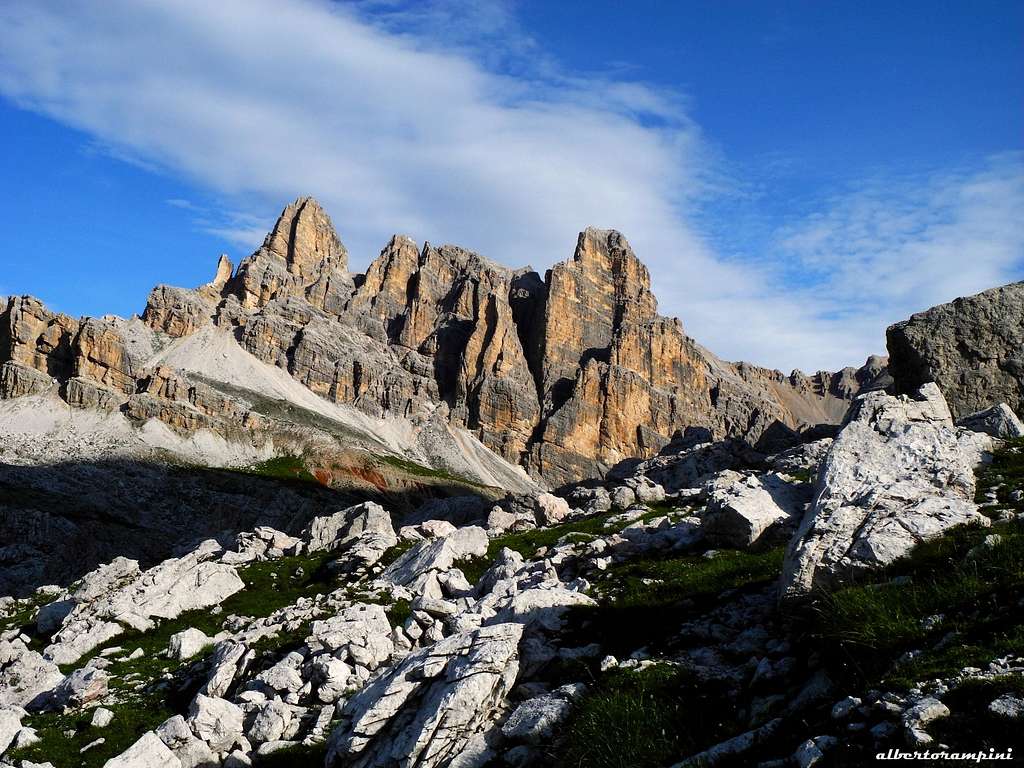
Main Routes
Castelletto main routes from left to right
According to the Italian climbing areas'habit, trad routes grades are expressed in UIAA Scale, while the modern routes ones are expressed in French Scale.
North-West Face
- Pacchia 6c+ max, 6c obbl., 220 m. Marco Sterni and Mauro Florit, summer 2003 - Modern route, bolts
- La Grande Guerra 7a+ max, 6b obbl., 210 m Marco Sterni, Massimo Sacchi, Mauro Florit, summer 2003 - Modern route, bolts
South-West Face
- Via Ghedina VI- (a move), V, 230 m. L. Ghedina, E. Monti, M. Zardini 1947 - Trad route
- GuGu VI+ max (or A0), 250 m. Mario Dibona, Gretchen Alexander, Armando Nascè 2007 - Mixed equipment (bolts and pegs)
Ghedina Spur, a fine classic route
Via Ghedina report - UIAA scale
Summit altitude: m 2656
Difficulty: Alpine TD-, UIAA max VI-
Route length: 230 m
Exposure: SW
First ascent: L. Ghedina, E. Monti, M. Zardini, 1947
Starting point: Road-house Ra Nona, Falzarego road
A classic trad climb on excellent rock with some superb pitches. The crux pitch is well protected. Spectacular views all around.
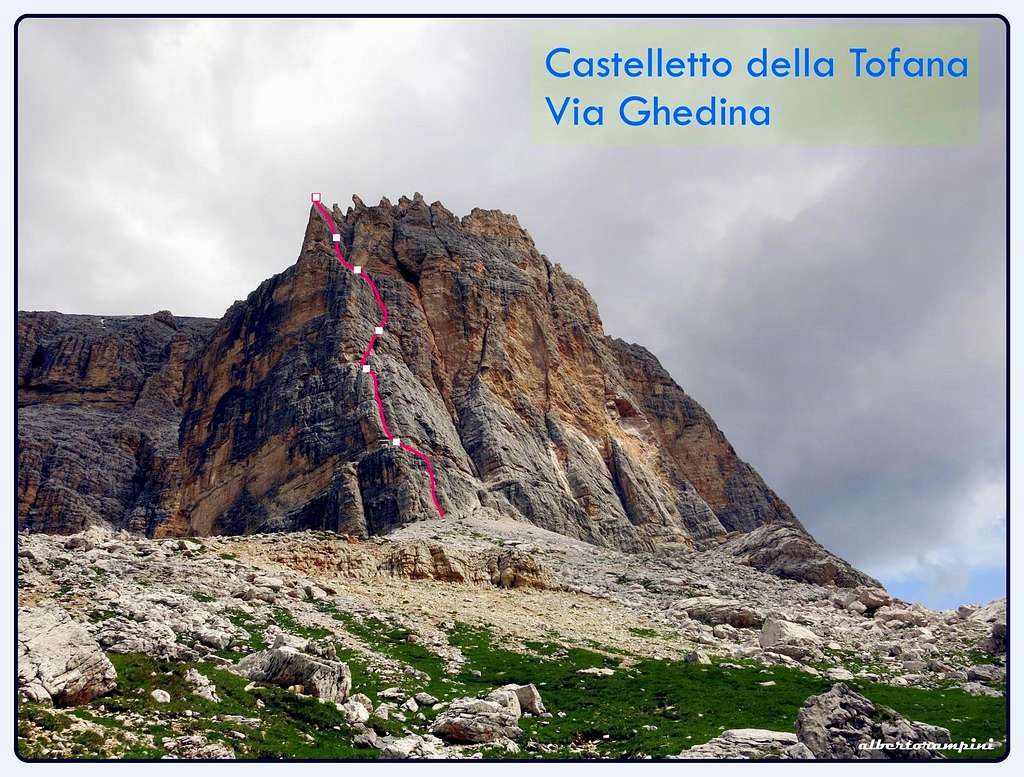
L1 - Climb the dihedral (sometimes crumbly rock), reaching a second sloping dihedral a bit to the left of the first one. Reach a chimney, climb it and exit to a wide ledge above another obvious dihedral. Belay below this latter. IV+, IV, IV-, 40 m
L2 - Climb a little wall of clear rock, leading below the overhang that marks the beginning of the dihedral. Climb entirely the superb dihedral with beautiful sustained climbing, passing on the left of an edge. Climb the dihedral again, always involving a sustained climb, exiting on a small ledge. After a short 5 m wall, belay on an outcrop with sangles. V-, 50 m
L3 - Turn the outcrop and follow a ridge, then enter a chimney. Up the chimney with beautiful climbing to the stance. III, IV, 45 m
L4 - Up directly the vertical wall with challenging sustained climb, keeping a bit on the right, to enter into a crack. Follow it all the way, climbing some athletic blades slightly overhanging and reaching a convenient stance on a ledge under a dihedral yellow (which must not be climbed) in which there are other pegs. VI-, V, V-, 45 m
L5 - Move some meters to the left along the ledge to reach a crack slanting right (a little more to the left visibile the spit of "The Great War"). Climb the crack and continue up on yellow rock, passing to the left of a blade. Climb for about 5 m along a dihedral-channel, crossing to the left for about 10 meters and exiting to a belay. Here, too, a little to the left, visible the spits of the "Great War". IV+, V, 25 m
L6 - Climb the beautiful slab above, slightly diagonal to the left, heading to the edge on the left. Cross the crest of the peak and belay on a stance only a few meters further. IV+, 30 m.
Descent: from the stance a 40 meters abseil leads to a wide ledge. Follow the ledge to the right, reaching the gully between Tofana di Rozes and Castelletto. Down the scree valloon following an obvious track - a short iron fixed rope - then skirt the Castelletto to the North, getting to the starting point of the route
The First World War on Castelletto
The mine of Castelletto
After a long period of immobility, with continuous bombing and numerous deaths and injuries amongst both the Austro-Hungarian and Italian troops, a commando of volunteers, led by Lieutenant Dazio De Faveri, managed to steal the top of Tofana di Rozes. However, between this latter and Cima Bois, the so-called "Castelletto", a rocky tower knight in the Val Costeana and Val Travenanzes, completely inaccessible from below, tenaciously resisted, remaining in Austrian hands until 1916, July 11th, when the Italians blew up with a powerful mine 35 tons of explosives: perished on that occasion about 150 Hungarian and Austrian soldiers.
Red Tape
No permits, no fees and no particulary restrictions in hiking and climbing.
When to Climb
Best period to climb goes from June to September
Where to stay
Several accomodations possible in Cortina d'Ampezzo and surroundings.
Meteo
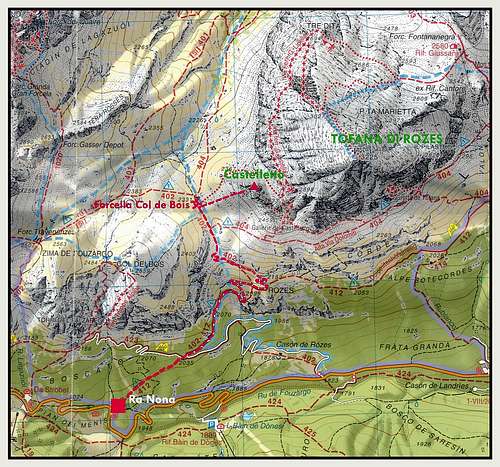
ARPAV DOLOMITI METEO Phone +390436780007 fax +390436780008
CENTRO VALANGHE DI ARABBA Phone +390436755711 fax 043679319 e-mail cva@arpa.veneto.it
Guidebooks and maps
Guidebooks
“IV grado e più – Dolomiti Orientali 2” by Emiliano Zorzi – Luca Brigo – Carlo Piovan Idea Montagna Ed.
“Arrampicare a Cortina d’Ampezzo e dintorni – Le vie più belle nelle Dolomiti” by Mauro Bernardi, Ed. Athesia
“Dolomiti Orientali Vol. I – Parte I” by Antonio Berti - Collana Guide dei Monti d’Italia, CAI TCI
Maps
Tabacco sheet 03 – Cortina e Dolomiti Ampezzane 1:25.000
Kompass sheet 55 - Cortina d'Ampezzo 1:50.000




